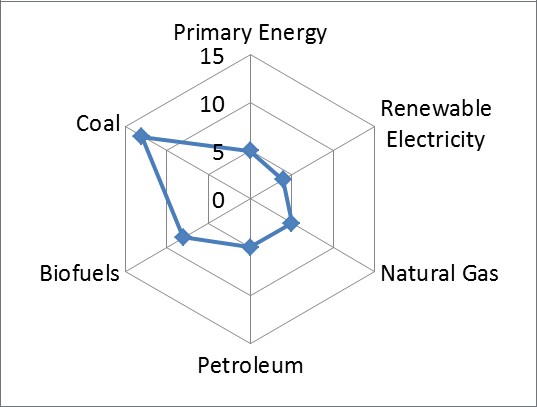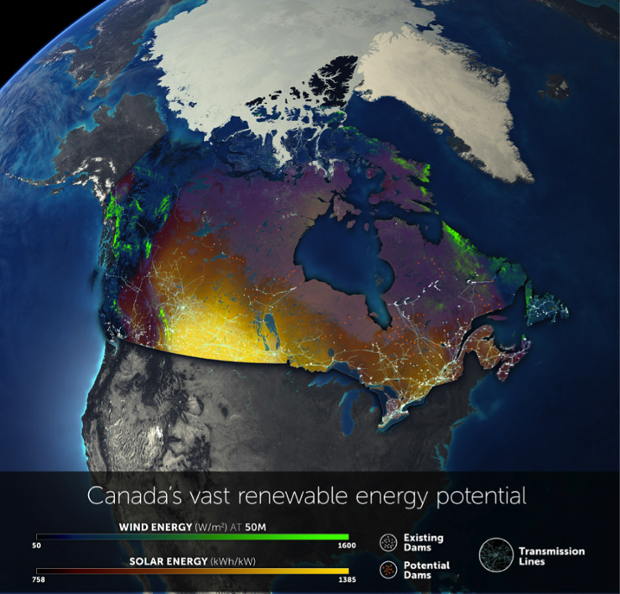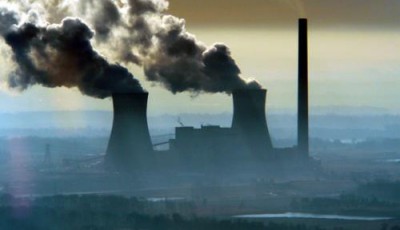Canada as an Energy Superpower- A Concept Revisited
By Ken White
GLOBE-Net, April 18, 2015 – There have been many references over the past decade calling Canada an “energy superpower”. Apart from the political debate the term has engendered, many see the label more as a marketing ploy than as a statement of reality.
There is no doubting Canada is a ‘super producer’ of energy, ranking among the five largest energy producers in the world, behind China, the United States, Russia, and Saudi Arabia. But does this translate into being an ‘energy super power’?
The United States Energy Information Administration in its report on Canada reinforces Canada’s position as an energy producer, but adds an important rider: “Just as the United States depends on Canada for much of its energy needs, so is Canada profoundly dependent on the United States as an export market.”

- Canada’s Global Ranking for Specific Primary Energy Production
It’s an important point. As Canadian energy expert Mike Cleland pointed out in his excellent and still relevant 2007 article on Canada as an energy superpower, real power means “possession of control, authority or influence over other countries and having the ability to affect world events.”
He adds, being a superpower implies:
- A capability to influence the behaviour of other countries and the course of world events;
- The capacity to deploy that capability where and when it can be effective;
- Articulate policies that specify how that capability can further one’s national interest; and,
- A will, credibly understood by others, to use the capability when called upon to do so.
By these criteria, labelling Canada as an ‘energy superpower’ may not be totally accurate. For example:
Influence over the behavior of other countries
- Canada’s most important goal in terms of influencing other countries energy-related behavior, among other things, involves encouraging the American President to approve the Keystone Pipeline. This objective has not been realized, although admittedly there were other domestic political factors in play that likely will cross over to the next U.S. President in 2016.
- Canada, in spite of being a top producer of crude petroleum has virtually no influence on international oil prices. In fact, bitumen from the Athabasca oil sands is sold at the Western Canadian Select (WCS) rate, which is lower than either the West Texas Intermediate (WTI) or Brent prices.
Capacity to deploy “Superpower” capability
- Canadian crude oil and bitumen suffers from serious transportation bottlenecks (no new pipelines are being built).
- While several LNG plants are being considered by major energy players for the British Columbia West Coast, it will be several years before (or if) any of these major projects becomes a reality.
- In short, in spite of having a substantial oil and gas production capability, Canada is lacking the necessary infrastructure to transport this energy to exports markets. In fact, even the ability of major energy producers in Western Canada to serve markets in Central and Atlantic Canada is limited for want of pipeline infrastructure.
National Interest
- The huge growth in rail traffic carrying crude oil is causing system wide congestion and creating bottlenecks for moving grain. Grain exports are as important to Canada’s national interest as is crude oil and the tradeoff between carrying these two commodities is not in the national interest. In addition, crude oil traffic by rail is associated in the public mind with serious accident risks.
- The three major pipelines that are being planned (Gateway, Kinder Morgan and Energy East) are being very carefully reviewed for environmental and aboriginal rights issues, and Canada has strong regulations and a highly protective culture for both the environment and aboriginal rights. However, when examined from a holistic perspective, especially with transportation bottlenecks and high rail risks, these dimensions of the national interest are not being well served.
- In addition to infrastructure-related constraints on shipping raw bitumen and LNG, there is minimal domestic value added processing of crude petroleum, natural gas and bitumen. These products are being exported raw. Theoretically, the national interest is much better served when the raw resources are processed in whole or in part in Canada. This value added processing occurs only minimally and raw exports rule the day.
Understanding by others
- Canada has acquired the reputation internationally as a serious polluter and has been criticized for its minimalist carbon management policies and regulations at the federal level. Indeed most substantive control of carbon emissions is being exercised at the provincial level.
- In an interview on the CBC National April 17, 2015 Christiana Figueres, UN Chief on Climate Change reiterated the perception in the international community that Canada is an outlier on climate change. In fact, Canada is one of the participating countries that has not yet submitted its “intended nationally determined contributions”for review and discussion at the upcoming United Nations Climate Change Conference. (See video below)
- The UN Chief stated that it is in Canada’s best interest to act on reducing its carbon footprint and to participate fully with the global community on this file. She stated in the interview several times that taking action on climate change is associated with both a strong business acumen (growing jobs and GDP) as well as helping our environment.
- British Columbia, Alberta and Ontario are currently in the lead on carbon management policies. British Columbia has a carbon tax, which has received highly positive reviews. Quebec has been collecting a tax on “hydrocarbons” (petroleum, natural gas and coal) since 2007and is active in a carbon trading market with California. Ontario and Quebec have agreed on a cap-and-trade system to put a price on carbon in an effort to reduce greenhouse gas emissions. Alberta has an intensity based carbon tax.
Who is leading the way?
Canada’s Ecofiscal Commission has just published The Way Forward, A Practical Approach to Reducing Canada’s Greenhouse Gas Emissions. This report discusses Canada’s carbon management policies within the context of a joint federal provincial framework but acknowledges it is the provinces that are demonstrating stronger leadership.
Successfully operating in a social democracy such as ours and within the context of the federal provincial division of powers is a prerequisite to being an energy superpower. Admittedly the relative roles of provinces, the federal government and of First Nations are an evolving tableau and encouraging this evolution to percolate is perhaps the most prudent approach in the short term. But is not sufficient justification for inaction.
And while one cannot disagree with the Commission’s conclusion that “doing nothing” in response to climate change is not a viable policy option, it is difficult to see how Canada’s carbon management policies and programs could be truly effective without strong federal leadership that integrates regional strengths with our overall national interests.

How can Canada become an energy superpower?
Given the uncertain global energy outlook and the potential for the global energy demand-supply imbalance that will surely contribute to international tensions, Canada can build on its reputation for innovation and research to become a supplier of energy innovation and expertise to the world.
With our human and natural resource strengths, energy is one area where Canadian’s can work together to show real global leadership—providing energy that is responsible, sustainable and reliable.
Indeed, Canada has all the attributes to be a ‘responsible energy superpower’. These include:
- An endowment of virtually every primary energy form spans the nation and that can be developed more sustainably;
- The human talent to be a global leader technology development throughout the energy supply chain, and in all related services and technologies;
- The opportunity to contribute to world energy needs that underlie sustainable economic and social development—especially in developing countries; and
- The potential to supply abundant quantities of sustainable energy and energy technologies—hydro, bio-energy, wind, solar, cleaner fossil fuel, low risk nuclear and demand side management—to an energy hungry world.
Our competitive advantage lies in our strong science and technology capability to improve energy production productivity; our ability to sequester greenhouse gas emissions; and our ability to derive maximum industry benefits and to grow real output through a strengthened energy value chain.
The pursuit of these energy-related opportunities would contribute to the sustained prosperity—more jobs, increased wealth creation and expanded quality of life—not just in Canada, but globally.
A new role for Canada as a ‘Responsible Energy Superpower’ would involve more than just improving the supply and efficiency of production. It would embrace responsible resource development; respect for different societies, the recognition of aboriginal rights, and a commitment to helping others more seriously affected by climate change.
Building Canada’s energy superpower credentials from an environmental and carbon management perspective would be a long term undertaking, one that would have to be developed within the context of our federal-provincial framework and aboriginal rights.
It would be a challenge, but one we are more than able to overcome – provided of course if there is the will to do so and leadership from the top.







